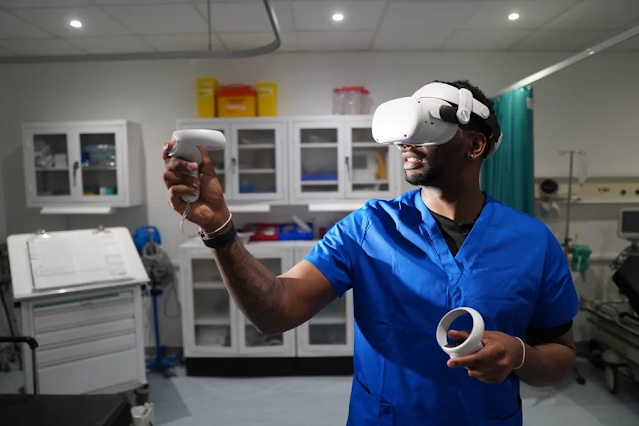Future of Virtual Reality in Health: A Futuristic Outlook
Virtual Reality (VR) is no longer confined to the realms of gaming and entertainment; it has transcended into the domain of healthcare, promising groundbreaking advancements. In this extensive exploration, we delve into the implications of virtual reality on the health sector, examining its potential, current applications, and the transformative journey that lies ahead.
Table of Contents
- Virtual Reality in Medical Training
- VR in Patient Therapy
- Revolutionizing Healthcare Education
- Enhancing Telemedicine with VR
- Data Visualization for Diagnosis
- Challenges and Ethical Considerations
- Future Trends: What Lies Ahead
Virtual Reality in Medical Training
Simulated Surgeries
Virtual reality is revolutionizing medical training by offering realistic simulated surgeries. Surgeons can practice and refine their skills in a risk-free environment, reducing the learning curve and enhancing patient safety.
Anatomy Exploration
Students and professionals alike can delve deep into the intricacies of human anatomy through immersive VR experiences. This hands-on learning approach provides a detailed understanding of the human body's complexities.
VR in Patient Therapy
Pain Management
VR is proving to be a powerful tool in pain management. Patients undergoing painful procedures can use VR to immerse themselves in soothing environments, diverting their attention from pain and discomfort.
Mental Health Interventions
From anxiety to PTSD, VR is becoming a therapeutic tool for mental health interventions. Virtual environments offer controlled settings for exposure therapy, aiding patients in overcoming various psychological challenges.
Revolutionizing Healthcare Education
Interactive Learning Modules
Traditional textbooks are making way for interactive VR learning modules. Students can engage with complex medical concepts in three-dimensional spaces, fostering a deeper understanding of medical principles.
Remote Medical Lectures
VR facilitates remote medical lectures, connecting experts with audiences worldwide. This democratization of knowledge ensures that medical professionals, regardless of their geographical location, have access to the latest advancements in their field.
Enhancing Telemedicine with VR
Virtual Consultations
Telemedicine takes a leap forward with VR-enabled virtual consultations. Doctors can interact with patients in a more immersive manner, gaining a better understanding of symptoms and improving the overall quality of remote healthcare.
Remote Monitoring
Patients with chronic conditions can benefit from VR-enabled remote monitoring. Physicians can track vital signs and health metrics in real-time, enabling proactive interventions and reducing hospital visits.
Data Visualization for Diagnosis
Medical Imaging in VR
Interpreting complex medical imaging becomes more accessible with VR. Physicians can navigate through three-dimensional reconstructions of CT scans and MRIs, enhancing diagnostic accuracy.
Understanding Complex Data
VR aids in comprehending intricate medical data sets. From genomics to patient records, visualizing complex data in a virtual environment facilitates better-informed decision-making by healthcare professionals.
Challenges and Ethical Considerations
Patient Privacy
As VR becomes integral to healthcare, ensuring patient privacy is paramount. Striking a balance between data utilization for medical advancements and safeguarding patient information is a critical ethical consideration.
Ensuring Ethical Use
The ethical use of VR in healthcare involves addressing concerns about consent, ensuring transparency in data usage, and establishing guidelines for responsible VR application development.
Future Trends: What Lies Ahead
AI Integration
The integration of artificial intelligence with VR holds immense potential. AI algorithms can enhance VR simulations, making them more adaptive and personalized for medical training and patient interventions.
Immersive Medical Conferences
The future might witness a shift from traditional medical conferences to immersive VR experiences. Healthcare professionals globally can participate in conferences without the constraints of travel, fostering collaboration and knowledge exchange.
FAQ About the Article
Q1: How is VR impacting medical training?
VR is transforming medical training by providing simulated environments for surgeons to practice surgeries and offering interactive learning modules for students to explore human anatomy.
Q2: Can VR be used for mental health interventions?
Yes, VR is being utilized for mental health interventions, providing therapeutic environments for patients to address conditions such as anxiety and PTSD.
Q3: What challenges does VR pose in healthcare?
Challenges include ensuring patient privacy in VR applications and addressing ethical considerations related to data usage and application development.








No comments:
You are welcome to share your ideas with us in comments!